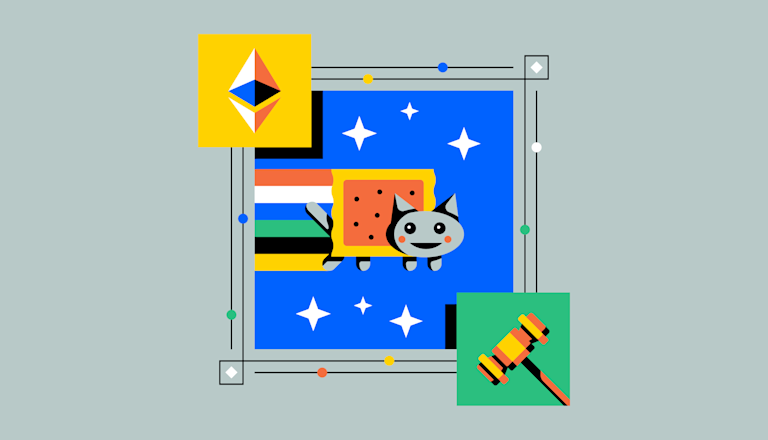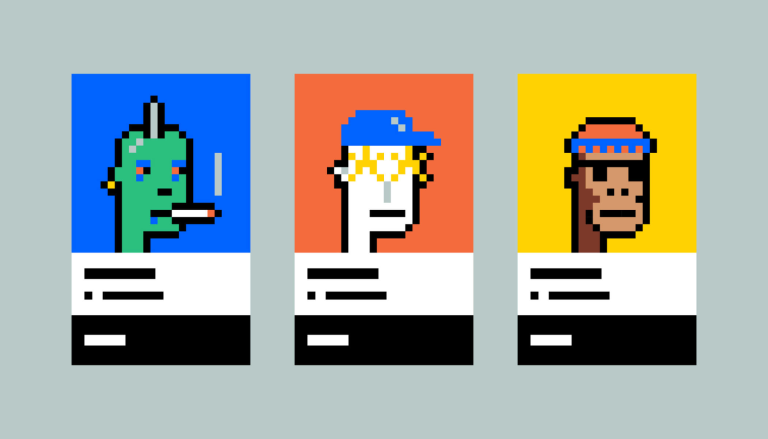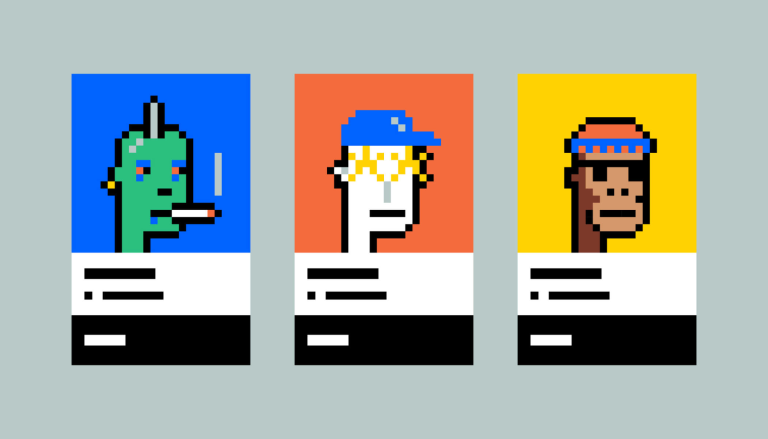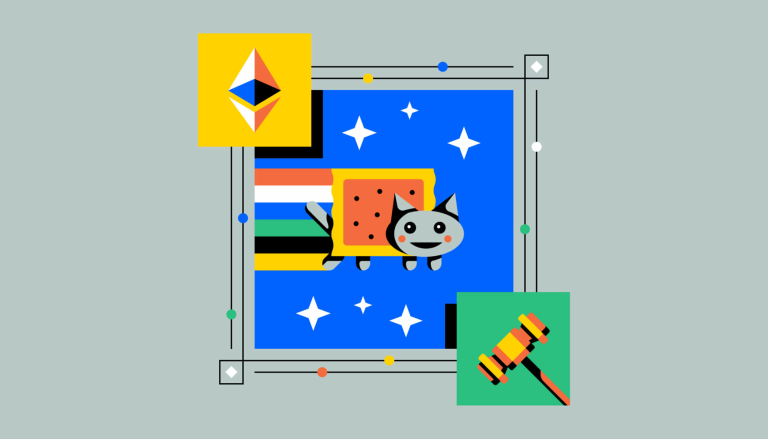What is a non-fungible token (NFT)?

Definition
NFTs (or “non-fungible tokens”) are a special kind of cryptoasset in which each token is unique — as opposed to “fungible” assets like Bitcoin and dollar bills, which are all worth exactly the same amount. Because every NFT is unique, they can be used to authenticate ownership of digital assets like artworks, recordings, and virtual real estate or pets.
In February 2021, a 10-second video by an artist named Beeple sold online for $6.6 million. Around the same time, Christie’s announced that it would be selling a collage of 5,000 “all-digital” works by the Wisconsin-based artist, whose real name is Mike Winkelmann. It was put on a virtual auction block with a starting price of $100 — and on March 11 it sold for a staggering $69 million.
Beyond the high prices, there was one other fact that observers found fascinating. In exchange for their money, collectors who buy Beeples don’t receive any physical manifestation of the artwork. Not even a framed print. What they do get is an increasingly popular kind of cryptoasset called an NFT — short for non-fungible token.
Each Beeple piece is paired with a unique NFT — a token attesting that each owner’s version is the real one. “We are in a very unknown territory,” Christie’s contemporary art specialist Noah Davis told Reuters. “In the first 10 minutes of bidding we had more than a hundred bids from 21 bidders and we were at a million dollars.”
Why are NFTs important?
You can think of NFTs as being kind of like certificates of authenticity for digital artifacts. They’re currently being used to sell a huge range of virtual collectibles, including:
NBA virtual trading cards
Music and video clips from EDM stars like Deadmau5
Video art by Grimes
The original “nyan cat” meme
A tweet by Dallas Mavericks owner and entrepreneur Mark Cuban
Virtual real estate in a place called Decentraland
As Bitcoin and other crypto has boomed in popularity over the last year, NFTs have also soared — growing to an estimated $338 million in 2020. Each NFT is stored on an open blockchain (often Ethereum’s) and anyone interested can track them as they’re created, sold, and resold. Because they use smart contract technology, NFTs can be set up so that the original artist continues to earn a percentage of all subsequent sales.
Along the way, NFTs have raised fascinating philosophical questions about the nature of ownership. Wondering why digital artifacts that can be endlessly copied and pasted have any value at all? Proponents would point out that most kinds of collecting isn’t based on inherent value. Old comic books were produced for pennies’ worth of ink and paper. Rare sneakers are often made out of the same materials as worthless ones. Some paintings hang in the Louvre, others end up in thrift shops.
As the collector who sold the $6.6 million Beeple piece noted, you can take a nice picture of the Mona Lisa, but it’s not the Mona Lisa. “It doesn’t have any value because it doesn’t have the provenance or the history of the work,” said the Beeple fan. “The reality here is that this is very, very valuable because of who is behind it.”
What does “non-fungible” mean?
Every bitcoin is worth as much as every other bitcoin. NFTs, on the other hand, are all unique. “Fungibility” refers to goods or assets that are all the same and can be swapped interchangeably. A dollar bill is another perfect example — each is worth exactly one dollar.
Concert tickets, by contrast, are non-fungible. Even if every Radiohead ticket is the same price, they aren’t directly exchangeable. Each represents a specific seat and a specific date — no other ticket will have those exact characteristics.
Where do you buy or sell NFTs?
Digital-artwork NFTs are mostly sold on specialized marketplaces like Zora, Rarible, and Opensea. If you’re more interested in games and sports collectibles, developers like Dapper Labs have created experiences including NBA Top Shot (virtual trading cards) and Cryptokitties (a Pokemon-ish digital-cat collecting app that actually was the first NFT hit in late-2017). Online games including Gods Unchained are starting to use NFTs to sell in-game assets like weapons or cosmetic upgrades. Real estate in new virtual worlds is sold via markets including Decentraland and The Sandbox.
You can also buy or sell some NFTs directly via a compatible crypto wallet.
How do NFTs work?
If you’re interested in DeFi, you might have heard of the ERC-20 standard, which allows anyone to create a token compatible with the Ethereum blockchain. Those are “fungible” tokens. Most non-fungible tokens are built using the ERC-721 and ERC-1155 standards, which allow creators to issue unique cryptoassets via smart contract. Because each NFT is stored on a blockchain, there is an immutable record starting with the token’s creation and including every sale. (Some NFT-focused developers have also built their own alternative blockchains, including Dapper Lab’s Flow.)
What can you do with NFTs once you buy them?
Good question! Some people display their digital artworks on large monitors. Some buy virtual real estate (via NFT, of course) in which they’re able to build virtual galleries or museums. You can also roam virtual worlds like Decentraland and check out other people’s collections. For some fans, the appeal is in the buying and selling — much like any other asset class. (The collector who sold the $6.9 million Beeple paid less than $70,000 for it in October 2020).
More and more mainstream artists have also gotten involved in the space — especially from the world of music. In early March, Nashville band Kings of Leon announced their next album would arrive in the form of multiple NFTs. Depending on which a fan buys, various perks will be unlocked — like alternate cover art, limited-edition vinyl, and even a “golden ticket” to a VIP concert experience.


